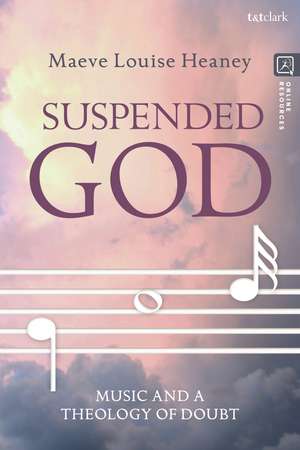Suspended God: Music and a Theology of Doubt
Autor Dr Maeve Louise Heaneyen Limba Engleză Paperback – 20 apr 2022
| Toate formatele și edițiile | Preț | Express |
|---|---|---|
| Paperback (1) | 179.41 lei 3-5 săpt. | +55.87 lei 6-12 zile |
| Bloomsbury Publishing – 20 apr 2022 | 179.41 lei 3-5 săpt. | +55.87 lei 6-12 zile |
| Hardback (1) | 503.64 lei 6-8 săpt. | |
| Bloomsbury Publishing – 20 apr 2022 | 503.64 lei 6-8 săpt. |
Preț: 179.41 lei
Preț vechi: 204.36 lei
-12% Nou
Puncte Express: 269
Preț estimativ în valută:
34.34€ • 35.75$ • 29.02£
34.34€ • 35.75$ • 29.02£
Carte disponibilă
Livrare economică 14-28 februarie
Livrare express 30 ianuarie-05 februarie pentru 65.86 lei
Preluare comenzi: 021 569.72.76
Specificații
ISBN-13: 9780567695604
ISBN-10: 0567695603
Pagini: 456
Dimensiuni: 156 x 234 x 28 mm
Greutate: 0.7 kg
Editura: Bloomsbury Publishing
Colecția T&T Clark
Locul publicării:London, United Kingdom
ISBN-10: 0567695603
Pagini: 456
Dimensiuni: 156 x 234 x 28 mm
Greutate: 0.7 kg
Editura: Bloomsbury Publishing
Colecția T&T Clark
Locul publicării:London, United Kingdom
Caracteristici
Explores the thought of great theologians through lenses original musical compositions
Notă biografică
Maeve Louise Heaney VDMF is a consecrated member of the Verbum Dei Community and Director of the Xavier Centre for Theological Formation at Australian Catholic University, Australia.
Cuprins
Introduction: An Apologetics of Theological ThinkingPart I: The Theological Dimension of Christian Song WritingChapter 1:Truth Matters: Intellectual Honesty and Incomplete CertitudeChapter 2:The Hidden History of Music in Theology Chapter 3:Unsung Sources: Theology in the Public Square of Music-MakingChapter 4: From Theory to Interiority: When is Music-Making Theological? Part II: Musicking theology: A Theopoetical Weaving of Christian ThinkersChapter 5: Can the Arts Contribute to our Knowledge of Truth? Chapter 6: Is Scripture a World for Women? Chapter 7: Is Beauty Superfluous to Human Life and Christian Faith? Chapter 8: How to Believe in God in such an Unjust World? Chapter 9: Is Original Sin an Outdated Doctrine? Chapter 10: Who's Going to Go to Heaven? Chapter 11: What is it with Christianity and Martyrdom? Chapter 12: Is Celibacy Ever a Good Idea? Chapter 13: Where on Earth is God?Chapter 14: Is How we Name God Important? Chapter 15: How can we Know if God is Trustworthy?Chapter 16: What Role does Sexuality have in Christian faith?BibliographyIndex
Recenzii
In her latest book, Maeve Heaney turns to music as a surprisingly fruitful theological response to an age marked by religious doubt and uncertainty. Her brilliant work, a groundbreaking new entry in the promising field of Theopoetics, startles us with a fresh appreciation of "musicking" as itself a profoundly theological activity.
Maeve Heaney's is a capacious heart. She is a contemplative of the mysteries of faith and of the gift of music, a practitioner of gospel ministry and song, and a thinker about faith, doubt, and beauty. All of this comes together in a generous and vulnerable invitation to theologians and pastors, musicians and artists, doubters and seekers, to explore what it means to believe, today and tomorrow.
In this courageous book, Maeve Heaney gifts Christians with an invitation to think intelligently about faith by trusting music making as a resource for meaning making. She seeks to encourage the next generation of Christians to approach the edge of knowledge confidently, and with musicians as companions, in order to propel the tradition forward in the discovery of dimensions of God yet unknown, especially when addressing multiple intersecting injustices theologically. Professors and teachers of theology looking for a text to invite reflection and conversation in their classrooms will find themselves in the open, imaginative, and skillful hands of a wise mentor. Students and artists will find in this book acknowledgement of their doubts and encouragement to approach the Mysterious with mindful wonder and critical curiosity.
Suspended God speaks to the contemporary need for theological language that has room for experiences - both joy and doubt - that are hard to put into words. She tells the story of the pressing need to encourage theology more fully toward flourishing and the ways in which this orientation can be supported by engagement with music as a site of theological reflection. I am grateful for Heaney's work and I am certain it will become reading for my courses on theopoetics.
Maeve Heaney's is a capacious heart. She is a contemplative of the mysteries of faith and of the gift of music, a practitioner of gospel ministry and song, and a thinker about faith, doubt, and beauty. All of this comes together in a generous and vulnerable invitation to theologians and pastors, musicians and artists, doubters and seekers, to explore what it means to believe, today and tomorrow.
In this courageous book, Maeve Heaney gifts Christians with an invitation to think intelligently about faith by trusting music making as a resource for meaning making. She seeks to encourage the next generation of Christians to approach the edge of knowledge confidently, and with musicians as companions, in order to propel the tradition forward in the discovery of dimensions of God yet unknown, especially when addressing multiple intersecting injustices theologically. Professors and teachers of theology looking for a text to invite reflection and conversation in their classrooms will find themselves in the open, imaginative, and skillful hands of a wise mentor. Students and artists will find in this book acknowledgement of their doubts and encouragement to approach the Mysterious with mindful wonder and critical curiosity.
Suspended God speaks to the contemporary need for theological language that has room for experiences - both joy and doubt - that are hard to put into words. She tells the story of the pressing need to encourage theology more fully toward flourishing and the ways in which this orientation can be supported by engagement with music as a site of theological reflection. I am grateful for Heaney's work and I am certain it will become reading for my courses on theopoetics.
